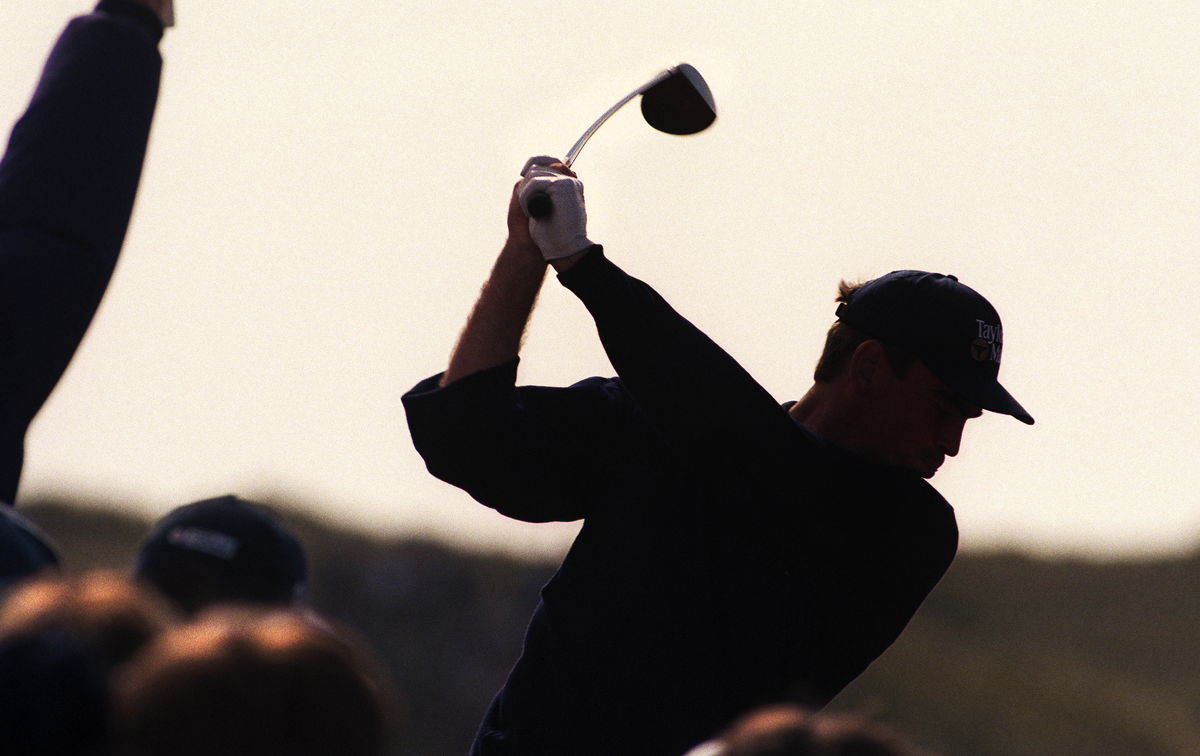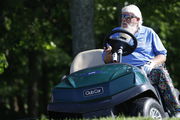
Getty
Silhouetted golfer on the tee during the 127th British Open Golf at Royal Birkdale GC in Southport 16th-19th July 1998. (Photo by David Ashdown/Getty Images)

Getty
Silhouetted golfer on the tee during the 127th British Open Golf at Royal Birkdale GC in Southport 16th-19th July 1998. (Photo by David Ashdown/Getty Images)
A year after Grayson Murray’s heartbreaking death by suicide at age 30, his former caddie and mentor Mike Hicks has reflected on the complex and emotional journey of the two-time PGA Tour winner. In a conversation with NCG, Hicks revealed that Murray’s issues were evident long before he made his name in professional golf.
Watch What’s Trending Now!
“Grayson was a troubled young man from an early age,” Hicks said. “Even at age 10, he did some things on the course that my kid’s clubs would’ve been locked up for a while, had he done that, and Eric knew that.” Hicks, who famously caddied for Payne Stewart during his iconic U.S. Open win in 1999, first encountered Murray on the junior circuit in North Carolina, where their sons competed against each other. He immediately recognized Grayson’s immense talent but also the signs of emotional turbulence that would follow him into adulthood.
After helping Murray rise from the Korn Ferry Tour to the PGA Tour in the 2016–17 season, Hicks and Murray parted ways dramatically at the 2017 Wells Fargo Championship when Hicks overheard the young pro dismissing his own father as a caddie mid-round. Seven years later, the golf world was stunned when Murray, after a career resurgence that included a win at the 2024 Sony Open, tragically ended his life. His battle with depression and alcoholism had been public, and while his openness earned admiration, it underscored deeper struggles with mental health, loneliness, and addiction.
ADVERTISEMENT
Mike Hicks spoke with me about Grayson Murray, who he caddied for and helped rise up the professional ranks to the PGA Tourhttps://t.co/AbiAoT6nCo
— Matt Chivers (@mgchiversNCG) June 5, 2025
“He lost a battle that a lot of people lose,” Hicks said. “It’s sad. You wish it could have been addressed earlier in his life – just an incredible talent. It was fun to watch him when he was on. It was special.” Hicks’ reflections offer insight into Murray’s complexity — a gifted golfer whose early flashes of brilliance were shadowed by emotional challenges that were never fully resolved. His story continues to spark conversations about mental health in sports and the urgent need for early support and open dialogue. To carry that mission forward and ensure his struggles weren’t in vain, Murray’s family has transformed their grief into purpose.
Top Stories
Pebble Beach Looks Unrecognizable as Harsh Weather Destroys Iconic Golf Course

Phil Mickelson’s LIV Golf Hope Shatters After Akshay Bhatia Decision

LIV Golf Launches Strict New Rules for Pros as Jon Rahm Makes His Feelings Clear

PGA Tour Hands Veteran Pro 1-Year Ban Despite Severed LIV Golf Ties

John Daly to Keep Masters Tradition Alive Despite Hooters’ Bankruptcy Shutdown

ADVERTISEMENT
Grayson Murray Foundation: Turning tragedy into hope
In the wake of Grayson Murray’s heartbreaking passing in May 2024, his family launched the Grayson Murray Foundation in January 2025 to honor his legacy and confront the mental health and addiction challenges that defined much of his life. Founded by his parents, Eric and Terry Murray, the Raleigh-based nonprofit is dedicated to raising awareness, advancing research, and expanding access to life-saving services—especially for those in high-pressure environments like professional sports. Grayson, a two-time PGA Tour winner, was unflinchingly open about his struggles with anxiety, depression, and alcoholism. Now, his legacy lives on through a foundation built to inspire change and support those silently battling similar demons.
The foundation has already garnered powerful support. PGA Tour pro Will Zalatoris pledged $25,000 to the cause—matched by the Simmons First Foundation—during a tribute at the 2024 Simmons Bank Open. Led by Grayson’s family and closest supporters, the initiative is more than just a memorial—it’s a call to action. For those looking to get involved or donate, can visit graysonmurrayfoundation.com.
ADVERTISEMENT
ADVERTISEMENT
ADVERTISEMENT
ADVERTISEMENT

